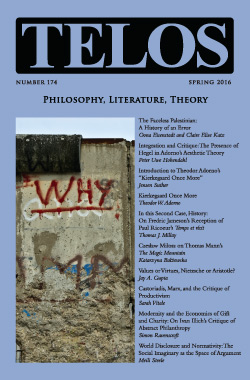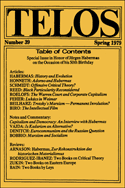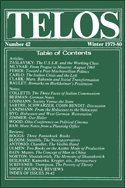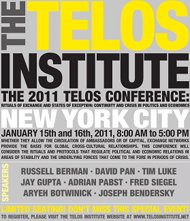By Jack Robert Edmunds-Coopey · Thursday, October 18, 2018 As an occasional feature on TELOSscope, we highlight a past Telos article whose critical insights continue to illuminate our thinking and challenge our assumptions. Today, Jack Robert Edmunds-Coopey looks at Herbert Marcuse’s “Contributions to a Phenomenology of Historical Materialism” from Telos 4 (Fall 1969).
Herbert Marcuse’s “Contributions to a Phenomenology of Historical Materialism” (1928) continues his efforts at fusing a contemporary form of Marxism with the work of his doctoral supervisor Martin Heidegger and his phenomenological project in Sein und Zeit (1927). The central tenet that Marcuse uses to construct a thread between Marxism and phenomenology is the analysis of the concrete and the correctness of knowledge as a truth related to this concreteness. The significance of Marxism as a theory of analysis is its self-reflexivity, the means by which it reflects on the process of historicity itself and, in addition to this, the processes of becoming that it undergoes as a result of its historical analysis. The difference here is that phenomenology claims to investigate the essences of things but does not concern itself with its own method or with a dialectical approach between the abstract and concrete, which inevitably occur as one attempts to capture a representation of an object.
Continue reading →
By Russell A. Berman · Monday, March 14, 2016 Telos 174 (Spring 2016): Philosophy, Literature, Theory is now available for purchase in our store.
 In this issue, Telos turns to a diverse set of philosophers, contemporary and classical, and questions, concerning ethics and politics on the one hand, and literature and aesthetics on the other. More often than not, those distinctions turn out to be difficult to maintain. A case in point is the opening essay, which examines how statements by Levinas have been subjected to political readings in order to impute to him positions that he did not hold. What are the ethics of intentional misreadings? In their meticulously argued analysis, Oona Eisenstadt and Claire Elise Katz demonstrate how the philosopher’s comments in a 1982 radio interview, in the immediate aftermath of the massacres in the Sabra and Shatila refugee camps in Lebanon, have been subjected to increasing degrees of misrepresentation, culminating in false accusations that he justified the killings. These insinuations involved fabricating quotations to put words in his mouth. Eisenstadt and Katz expose the poor philology and tendentious politics implicit in such distortion. In this issue, Telos turns to a diverse set of philosophers, contemporary and classical, and questions, concerning ethics and politics on the one hand, and literature and aesthetics on the other. More often than not, those distinctions turn out to be difficult to maintain. A case in point is the opening essay, which examines how statements by Levinas have been subjected to political readings in order to impute to him positions that he did not hold. What are the ethics of intentional misreadings? In their meticulously argued analysis, Oona Eisenstadt and Claire Elise Katz demonstrate how the philosopher’s comments in a 1982 radio interview, in the immediate aftermath of the massacres in the Sabra and Shatila refugee camps in Lebanon, have been subjected to increasing degrees of misrepresentation, culminating in false accusations that he justified the killings. These insinuations involved fabricating quotations to put words in his mouth. Eisenstadt and Katz expose the poor philology and tendentious politics implicit in such distortion.
Continue reading →
By Matt Applegate · Tuesday, December 17, 2013 As an occasional feature on TELOSscope, we highlight a past Telos article whose critical insights continue to illuminate our thinking and challenge our assumptions. Today, Matt Applegate looks at Yvette Biro’s “The Intellectual Film: Eisenstein’s Plan to Film Marx’s Capital“ from Telos 39 (Spring 1979).
 It is difficult to think of what cinema is in the present, and indeed, what cinema might be in the future, outside of large studio systems, box office opening numbers, and global profit intake. Even so-called “independent” films often circulate in a virtual minor league of the Hollywood studio system, vying for wide release. To be sure, cinema’s thorough commodification both limits its potential for aesthetic experimentation and makes it easier to equate it with other forms of media. When cinema becomes secondary to the metrics of profit, its distinct aesthetic qualities are subordinate to its function as a product comprised of moving images and sound. Moreover, as film moves away from celluloid and toward digital formats, one is compelled to ask what makes cinema distinct as visual technology is homogenized. This is not to say that cinematic experience and practice are bankrupt aesthetic qualities or that film is doomed to devolve into an indistinct mesh of CGI and user-generated websites like YouTube and Vine. Rather, as Yvette Biro suggests in her “The Intellectual Film: Eisenstein’s Plan to Film Marx’s Capital,” the horizon of cinematic thought and practice is perhaps best imagined by examining the relation between ideology and cinematic aesthetics. It is difficult to think of what cinema is in the present, and indeed, what cinema might be in the future, outside of large studio systems, box office opening numbers, and global profit intake. Even so-called “independent” films often circulate in a virtual minor league of the Hollywood studio system, vying for wide release. To be sure, cinema’s thorough commodification both limits its potential for aesthetic experimentation and makes it easier to equate it with other forms of media. When cinema becomes secondary to the metrics of profit, its distinct aesthetic qualities are subordinate to its function as a product comprised of moving images and sound. Moreover, as film moves away from celluloid and toward digital formats, one is compelled to ask what makes cinema distinct as visual technology is homogenized. This is not to say that cinematic experience and practice are bankrupt aesthetic qualities or that film is doomed to devolve into an indistinct mesh of CGI and user-generated websites like YouTube and Vine. Rather, as Yvette Biro suggests in her “The Intellectual Film: Eisenstein’s Plan to Film Marx’s Capital,” the horizon of cinematic thought and practice is perhaps best imagined by examining the relation between ideology and cinematic aesthetics.
Continue reading →
By Robert Wyllie · Tuesday, October 22, 2013 As an occasional feature on TELOSscope, we highlight a past Telos article whose critical insights continue to illuminate our thinking and challenge our assumptions. Today, Robert Wyllie looks at Alain Manville’s “Hegel and Metaphysics,” from Telos 42 (Winter 1979).
 In “Hegel and Metaphysics,” Alain Manville joins the echelon of French theorists who attempt to focalize Hegelianism around one core concept. In the vanguard, Jean Wahl turned unhappy consciousness into an organizing principle for reading Hegel. More famously, Alexandre Kojève pared Hegelianism down to the core master-slave dialectic. Manville focuses upon the annihilation of metaphysics in Hegel’s speculative recognition that being equals nothingness. Speculative thought transcends the understanding (Vernunft), which sees only an ontological contradiction. Hegel dismisses Vernunft and metaphysics, Manville argues, to grasp concrete reality in a postmetaphysical sense. In “Hegel and Metaphysics,” Alain Manville joins the echelon of French theorists who attempt to focalize Hegelianism around one core concept. In the vanguard, Jean Wahl turned unhappy consciousness into an organizing principle for reading Hegel. More famously, Alexandre Kojève pared Hegelianism down to the core master-slave dialectic. Manville focuses upon the annihilation of metaphysics in Hegel’s speculative recognition that being equals nothingness. Speculative thought transcends the understanding (Vernunft), which sees only an ontological contradiction. Hegel dismisses Vernunft and metaphysics, Manville argues, to grasp concrete reality in a postmetaphysical sense.
Continue reading →
By Richard Gilman-Opalsky · Friday, February 4, 2011 The following text was presented at the 2011 Telos Conference, “Rituals of Exchange and States of Exception: Continuity and Crisis in Politics and Economics.”
(For the people of Tunisia.)
 There is a tension in Guy Debord’s crisis theory, which stems from a particular bifurcation in his own consideration of crisis. On the one hand, Debord sought to completely deconstruct the Marxian logic of crisis, but on the other, his own situationist theory of praxis depended on the relationship between crisis and opportunity. In short, Debord abandons any notion of the grand crises of world-historical significance, and looks instead to minor crises of ideology and critique. There is a tension in Guy Debord’s crisis theory, which stems from a particular bifurcation in his own consideration of crisis. On the one hand, Debord sought to completely deconstruct the Marxian logic of crisis, but on the other, his own situationist theory of praxis depended on the relationship between crisis and opportunity. In short, Debord abandons any notion of the grand crises of world-historical significance, and looks instead to minor crises of ideology and critique.
Continue reading →
|
|

 It is difficult to think of what cinema is in the present, and indeed, what cinema might be in the future, outside of large studio systems, box office opening numbers, and global profit intake. Even so-called “independent” films often circulate in a virtual minor league of the Hollywood studio system, vying for wide release. To be sure, cinema’s thorough commodification both limits its potential for aesthetic experimentation and makes it easier to equate it with other forms of media. When cinema becomes secondary to the metrics of profit, its distinct aesthetic qualities are subordinate to its function as a product comprised of moving images and sound. Moreover, as film moves away from celluloid and toward digital formats, one is compelled to ask what makes cinema distinct as visual technology is homogenized. This is not to say that cinematic experience and practice are bankrupt aesthetic qualities or that film is doomed to devolve into an indistinct mesh of CGI and user-generated websites like YouTube and Vine. Rather, as Yvette Biro suggests in her “The Intellectual Film: Eisenstein’s Plan to Film Marx’s Capital,” the horizon of cinematic thought and practice is perhaps best imagined by examining the relation between ideology and cinematic aesthetics.
It is difficult to think of what cinema is in the present, and indeed, what cinema might be in the future, outside of large studio systems, box office opening numbers, and global profit intake. Even so-called “independent” films often circulate in a virtual minor league of the Hollywood studio system, vying for wide release. To be sure, cinema’s thorough commodification both limits its potential for aesthetic experimentation and makes it easier to equate it with other forms of media. When cinema becomes secondary to the metrics of profit, its distinct aesthetic qualities are subordinate to its function as a product comprised of moving images and sound. Moreover, as film moves away from celluloid and toward digital formats, one is compelled to ask what makes cinema distinct as visual technology is homogenized. This is not to say that cinematic experience and practice are bankrupt aesthetic qualities or that film is doomed to devolve into an indistinct mesh of CGI and user-generated websites like YouTube and Vine. Rather, as Yvette Biro suggests in her “The Intellectual Film: Eisenstein’s Plan to Film Marx’s Capital,” the horizon of cinematic thought and practice is perhaps best imagined by examining the relation between ideology and cinematic aesthetics.  In “Hegel and Metaphysics,” Alain Manville joins the echelon of French theorists who attempt to focalize Hegelianism around one core concept. In the vanguard, Jean Wahl turned unhappy consciousness into an organizing principle for reading Hegel. More famously, Alexandre Kojève pared Hegelianism down to the core master-slave dialectic. Manville focuses upon the annihilation of metaphysics in Hegel’s speculative recognition that being equals nothingness. Speculative thought transcends the understanding (Vernunft), which sees only an ontological contradiction. Hegel dismisses Vernunft and metaphysics, Manville argues, to grasp concrete reality in a postmetaphysical sense.
In “Hegel and Metaphysics,” Alain Manville joins the echelon of French theorists who attempt to focalize Hegelianism around one core concept. In the vanguard, Jean Wahl turned unhappy consciousness into an organizing principle for reading Hegel. More famously, Alexandre Kojève pared Hegelianism down to the core master-slave dialectic. Manville focuses upon the annihilation of metaphysics in Hegel’s speculative recognition that being equals nothingness. Speculative thought transcends the understanding (Vernunft), which sees only an ontological contradiction. Hegel dismisses Vernunft and metaphysics, Manville argues, to grasp concrete reality in a postmetaphysical sense.  There is a tension in Guy Debord’s crisis theory, which stems from a particular bifurcation in his own consideration of crisis. On the one hand, Debord sought to completely deconstruct the Marxian logic of crisis, but on the other, his own situationist theory of praxis depended on the relationship between crisis and opportunity. In short, Debord abandons any notion of the grand crises of world-historical significance, and looks instead to minor crises of ideology and critique.
There is a tension in Guy Debord’s crisis theory, which stems from a particular bifurcation in his own consideration of crisis. On the one hand, Debord sought to completely deconstruct the Marxian logic of crisis, but on the other, his own situationist theory of praxis depended on the relationship between crisis and opportunity. In short, Debord abandons any notion of the grand crises of world-historical significance, and looks instead to minor crises of ideology and critique. 






